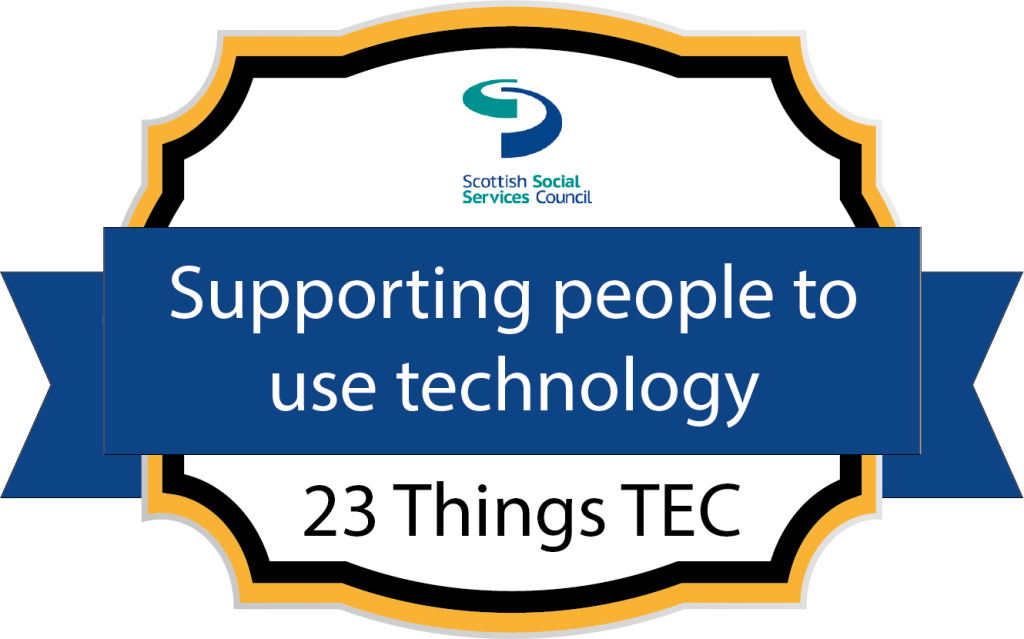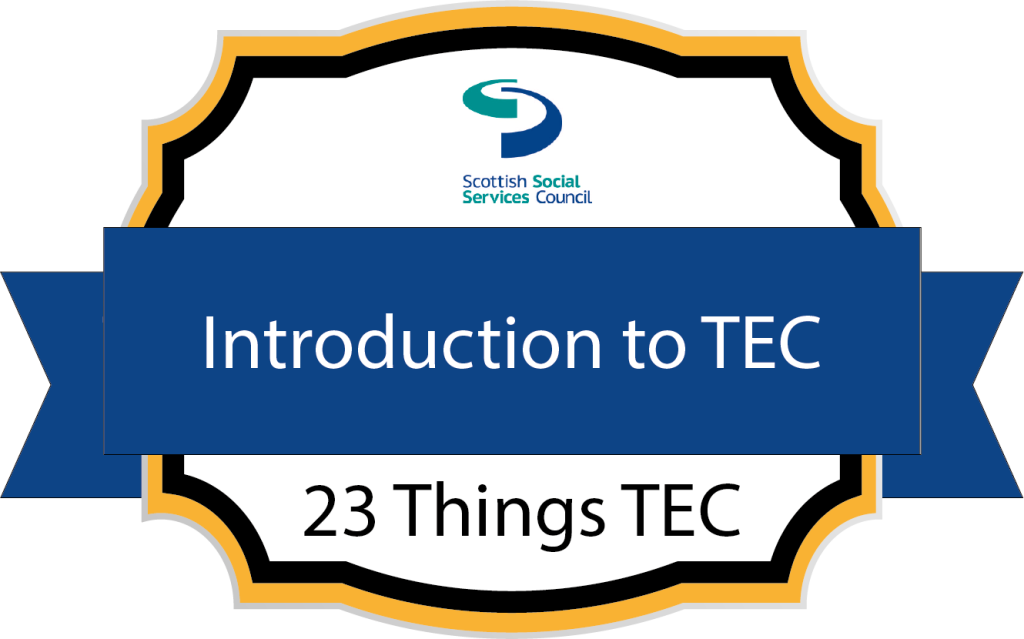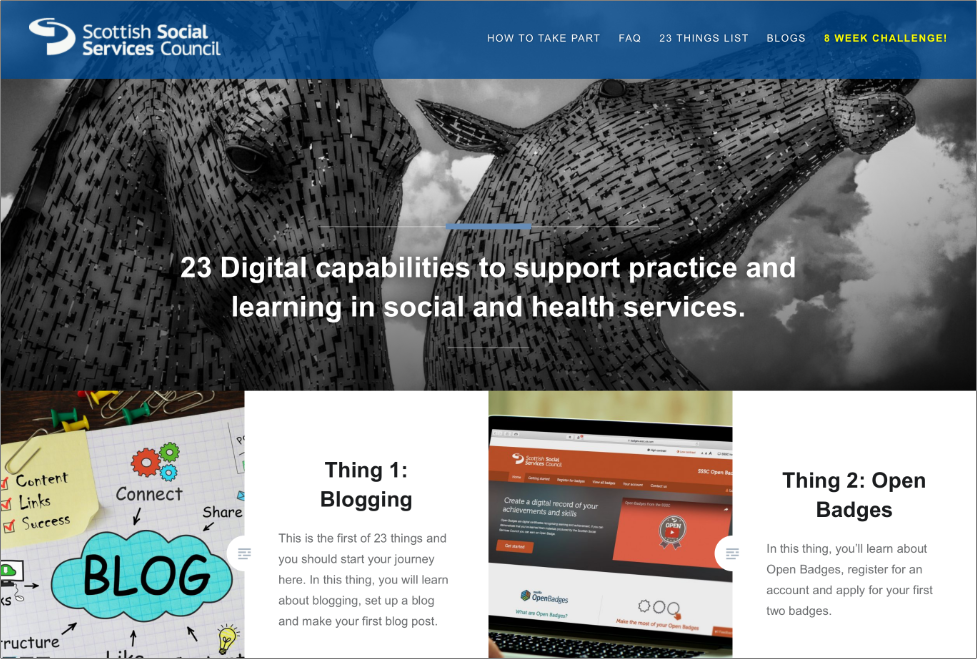Introduction
Technology can only support care if people know how to use it and are able to do so. People who are receiving services may be able to do this themselves, may require some assistance, or may have to rely on others to do it for them. It is important that you establish how much support someone needs as this will have an impact on it’s effectiveness.
MyLearning badge information
MyLearning Badge: SSSC 23 Things TEC – Thing 3: Supporting people to use technology.

Counts toward the Introduction to TEC milestone badge.

‘I don’t do technology.’
Like other aspects of care, we all have a role and responsibility to support people to use technology, so it is important that you know what you need to do. For example, if a person uses video like Skype or Face Time to keep in touch with loved ones, this is just as important as other forms of communication so should be recorded in their care plan. You must ensure that you know what support the person needs and be able to provide this in line with the care plan.
As workers, we all have a responsibility to ensure that we have the knowledge and skills required to address the needs of someone that are recorded in their care plan. If you are concerned that you do not have the skills or confidence to support people using technology, you must discuss this with your supervisor or line manager, who should support you to acquire these.
Learning Activity 1

Morag lives alone and has recently been diagnosed with Alzheimer’s disease. Her daughter, Shona, lives in Australia with her family, and is only able to visit Morag about once a year. Morag uses an iPad to have video calls with her grandchildren, which is something that is very important to her, as it helps her to feel connected with them. Lately, she has been having some difficulty remembering how to make video calls and what to do when her iPad rings. When you visit her, she tells you it is her granddaughter’s birthday today and asks you to help her to make a video call.
Think about the following questions and write down your answers. You can use your answers as part of your evidence for the open badge linked to this, so try to put down as much information as you can.
- How confident do you feel that you could help Morag there and then, and explain why?
- What knowledge and skills do you think you need to help Morag?
- How did you decide what support Morag needs?
- Which of the knowledge and skills do you already use in other circumstances like in your own life?
- What impact might there be for Morag if she is not able to make the call?
Digital capabilities are like other care skills.
If you think back to your first day in a care role, perhaps as a worker or volunteer, were you expected to know everything about what you should do? Your answer should be ‘no’ as much of your knowledge and skills are gained through experience. Digital capabilities or skills are no different. No-one should expect you to be an ‘expert’ in supporting people to use technology from day one, as your skills and confidence will develop through using them over time. You need to be aware though, like any other skills, you need to keep practicing them to maintain them.
There are many ways in which you can develop your digital capabilities. We all learn differently and have methods that we prefer. Here are some suggestions:
- Ask someone to show you how to do it. This can be a colleague, family member or friend.
- Google it. If you have a question, it is likely someone else has had that question and you can find a solution online. This can be a very good way to learn and develop skills but always remember to use reputable sources if possible.
- Get a book. If you prefer to read a manual, you can get a hard copy or an eBook. As technology can change very quickly, always check when it was published to ensure it is current.
- Do a course. Many colleges run short courses to help introduce people to digital technology.

Another way in which you can develop your digital capabilities is using the SSSC’s learning resource 23 Things Digital This is like 23 Things for Technology Enabled Care but focuses on helping you develop knowledge and skills with digital technologies.
We often hear people tell us that they are too old to learn digital skills to support people using technology, because younger people find it easier to use technology. This is a myth and there is no evidence that this is the case. How do you think someone might react if a colleague told them they were too old to provide personal care to people using your service?
Learning activity 2
Think about the people receiving care and support from your service. Write a list of all the technologies that they use or are used to support them. Remember to include all ‘electronic’ equipment and gadgets like microwave ovens, washing machines etc. Don’t be surprised if the list is bigger than you thought it would be.
From the list you have written, make a note of any that you feel you need to learn more about. If you are providing care at home services, it is likely that people will have different makes and models of equipment (with specific instructions for each one) in their homes, so think more about the type of technology. Now think about how you can access the learning you need for these that suits you and write this next to each one on your list. Once you have completed this activity, you should discuss it with your supervisor or line manager.
